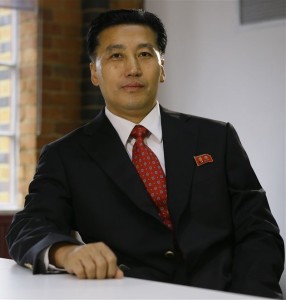- California Assembly OKs highest minimum wage in nation
- S. Korea unveils first graphic cigarette warnings
- US joins with South Korea, Japan in bid to deter North Korea
- LPGA golfer Chun In-gee finally back in action
- S. Korea won’t be top seed in final World Cup qualification round
- US men’s soccer misses 2nd straight Olympics
- US back on track in qualifying with 4-0 win over Guatemala
- High-intensity workout injuries spawn cottage industry
- CDC expands range of Zika mosquitoes into parts of Northeast
- Who knew? ‘The Walking Dead’ is helping families connect
N. Korea says bold action by US could open path to treaty

Senior North Korean Foreign Ministry official Jong Tong Hak poses before an interview with APTN in London, Tuesday, Nov. 3, 2015. North Korea says the United States needs to end its “nuclear blackmail“ and respond to Pyongyang’s recent diplomatic overture to formally end the decades-old Korean conflict. Fighting ended in 1953 without a peace treaty, leaving North and South Korea still technically still at war. (AP Photo/Kirsty Wigglesworth)
LONDON (AP) — North Korea says the United States needs to end its “nuclear-based threats and blackmail” and respond to the North’s recent diplomatic overture to formally end the decades-old Korean conflict. Fighting ended in 1953 without a peace treaty, leaving North and South Korea still technically at war.
Speaking in an interview Tuesday in London with Associated Press Television News, senior North Korean Foreign Ministry official Jong Tong Hak said a permanent peace settlement on the Korean Peninsula first requires a North Korean-U.S. agreement.
Discussing North Korea’s view of the root cause of tensions, he blamed what he described as “the U.S. government’s decades of hostile policies against the DPRK and its endless nuclear-based threats, blackmail and manipulative schemes.”
North Korea’s official name is the Democratic Peoples’ Republic of Korea, or DPRK.
He said Washington provides “strategic nuclear weapons” to South Korea, “in other words the nuclear-powered aircraft carriers it always pushes (toward the DPRK) and the strategic nuclear bombers it always has flying in the skies above the southern part of the Korean Peninsula.”
Jong said a compromise to break the impasse requires decisive action by Washington.
“The issue of signing a peace treaty between the DPRK and the United States depends on the policy determinations of the U.S. administration,” he said, adding that Washington must “make a policy decision to respect our republic’s sovereignty and end the decades-long hostility between the DPRK and the U.S. to guarantee peace in the Korean Peninsula.”
Last month, Sung Kim, U.S. special representative for North Korea policy, described the North’s latest proposal for treaty negotiations as “disingenuous.”
The two sides’ positions are so deeply at odds that it can seem like a chicken-or-egg situation.
Washington’s position – which is in line with ally South Korea – is that it is only open to talks on easing sanctions if the North makes it clear it is willing to negotiate an end to its nuclear program, stop developing long-range missiles that could reach foreign targets and live up to other international agreements.
North Korea, for its part, maintains that it must have a deterrent to counter the threat of a U.S. attack – nuclear or otherwise.
The U.S. Congress, meanwhile, is mulling whether the North should be designated a state sponsor of terrorism. That designation was lifted in 2008 during negotiations on its nuclear program that stalled soon after. Among the allegations was that North Korean-supplied rockets had been used against Israel by fighters from the militant group Hamas.
North Korea likes to point out that the U.S. has 28,500 troops stationed in South Korea. There are no foreign military bases in North Korea, though China was a key North Korea ally during the Korean War.















